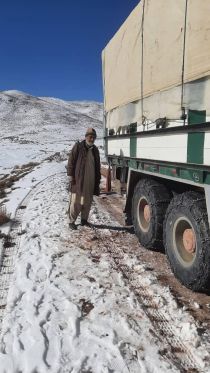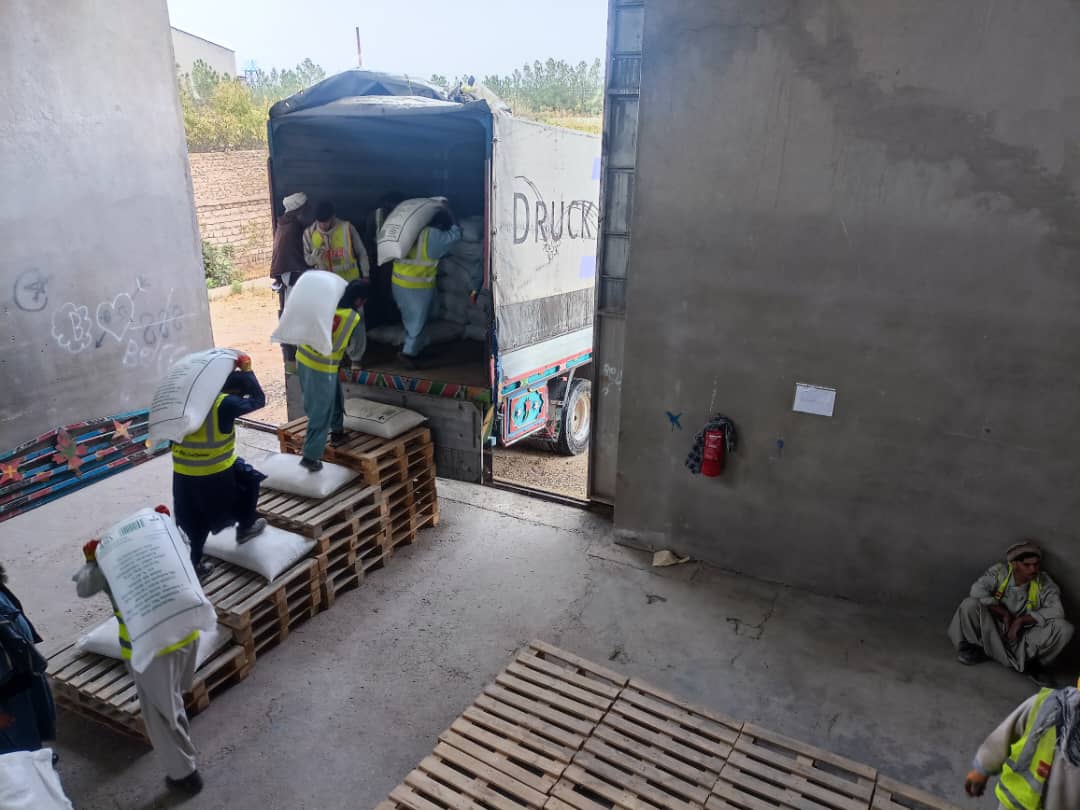share

Convoys transporting cement and food products in Ghor province, Afghanistan. | © HI
In Herat, Atlas Logistique – HI's technical and operational unit – is pursuing its efforts to ensure access to essential services despite the challenges of the winter season.
In this mountainous country where the climate makes access to isolated regions extremely difficult, HI/Atlas Logistique’s teams are doing their utmost to meet urgent humanitarian needs. Afghanistan is the world’s second most disaster-prone country, experiencing droughts, floods, earthquakes and particularly harsh winters.
 In winter, roads in remote provinces, often already in poor condition, become impassable because of snow, crevices and heavy frost. It can sometimes take trucks up to five days to cover 300 kilometres, as they have to drive at a very slow pace. These constraints make vulnerable populations even more isolated and limit their access to essential goods.
In winter, roads in remote provinces, often already in poor condition, become impassable because of snow, crevices and heavy frost. It can sometimes take trucks up to five days to cover 300 kilometres, as they have to drive at a very slow pace. These constraints make vulnerable populations even more isolated and limit their access to essential goods.
"We are in the middle of preparing what we call the Winterization. Our priority is to get non-perishable foodstuffs, warm clothing, blankets and building materials to the mountainous regions before the roads are completely blocked. The objective is to help people get through the months of January and February when they will be cut off from the rest of the country. Out of a population of 25 million, nearly 68% of people are undernourished or malnourished, and 70% have no access to drinking water," says Marc-Olivier Houche, Logistics Platform Project Manager for Atlas Logistique in Herat.
These alarming figures demonstrate the crucial importance of humanitarian action, particularly during the winter season when accessibility challenges are greatest.
 Atlas Logistique is renowned for its expertise in humanitarian logistics. In Afghanistan, it has set up three warehouses with a total surface area of 1,600 m² in which goods can be stored in optimal conditions. These warehouses have temperature-controlled areas (15-25°C) and ensure cold chain maintenance (2-8°C) for medicines and vaccines. Such facilities are rare in Afghanistan, but they are essential for ensuring the quality of sensitive products. For transport, cool boxes are used to maintain the cold chain, as there are no refrigerated trucks available in the country.
Atlas Logistique is renowned for its expertise in humanitarian logistics. In Afghanistan, it has set up three warehouses with a total surface area of 1,600 m² in which goods can be stored in optimal conditions. These warehouses have temperature-controlled areas (15-25°C) and ensure cold chain maintenance (2-8°C) for medicines and vaccines. Such facilities are rare in Afghanistan, but they are essential for ensuring the quality of sensitive products. For transport, cool boxes are used to maintain the cold chain, as there are no refrigerated trucks available in the country.
"We also have drivers’ assistants who supervise each journey to ensure the safety of the goods and the drivers and to oversee compliance with HI's strict standards," adds Marc-Olivier.
These standards include rigorous temperature monitoring for sensitive products, as well as safety protocols designed to protect the cargo and reduce the risks to drivers when travelling in isolated or high-risk areas.
Atlas Logistique works closely with 23 partner organisations in Afghanistan. Around half of them are local NGOs and many do not have all the logistical resources they need to run their aid operations effectively. Thanks to our logistics platform, they can now store their supplies, assemble kits (such as hygiene kits) and organise transport to remote areas. These services enable local NGOs to concentrate on their primary mission: helping vulnerable populations.
As well as providing storage and transport services, Atlas Logistique is playing a key role in building the capacity of logisticians in Afghanistan.
"We offer training in storage and transport techniques, but also in ethical principles and the management of the drugs supply chain, particularly for local NGOs handling health products," explains Marc-Olivier.
These training courses also target the private sector, in particular transport operators, to improve logistics standards throughout the country.
Atlas Logistique's mission is to meet the most urgent needs, even in the most inaccessible regions. This commitment is particularly crucial in Afghanistan, where the logistical challenges are heightened by conflict, extreme weather conditions and political tensions.
"As logistics experts, our role is to simplify the operations of other humanitarian actors and ensure that aid reaches the people who need it most, even in the depths of winter," concludes Marc-Olivier.








HI is an independent and impartial aid organisation working in situations of poverty and exclusion, conflict and disaster. We work alongside people with disabilities and vulnerable populations, taking action and bearing witness in order to respond to their essential needs, improve their living conditions and promote respect for their dignity and fundamental rights.
HI is an independent and impartial aid organisation working in situations of poverty and exclusion, conflict and disaster. We work alongside people with disabilities and vulnerable populations, taking action and bearing witness in order to respond to their essential needs, improve their living conditions and promote respect for their dignity and fundamental rights.